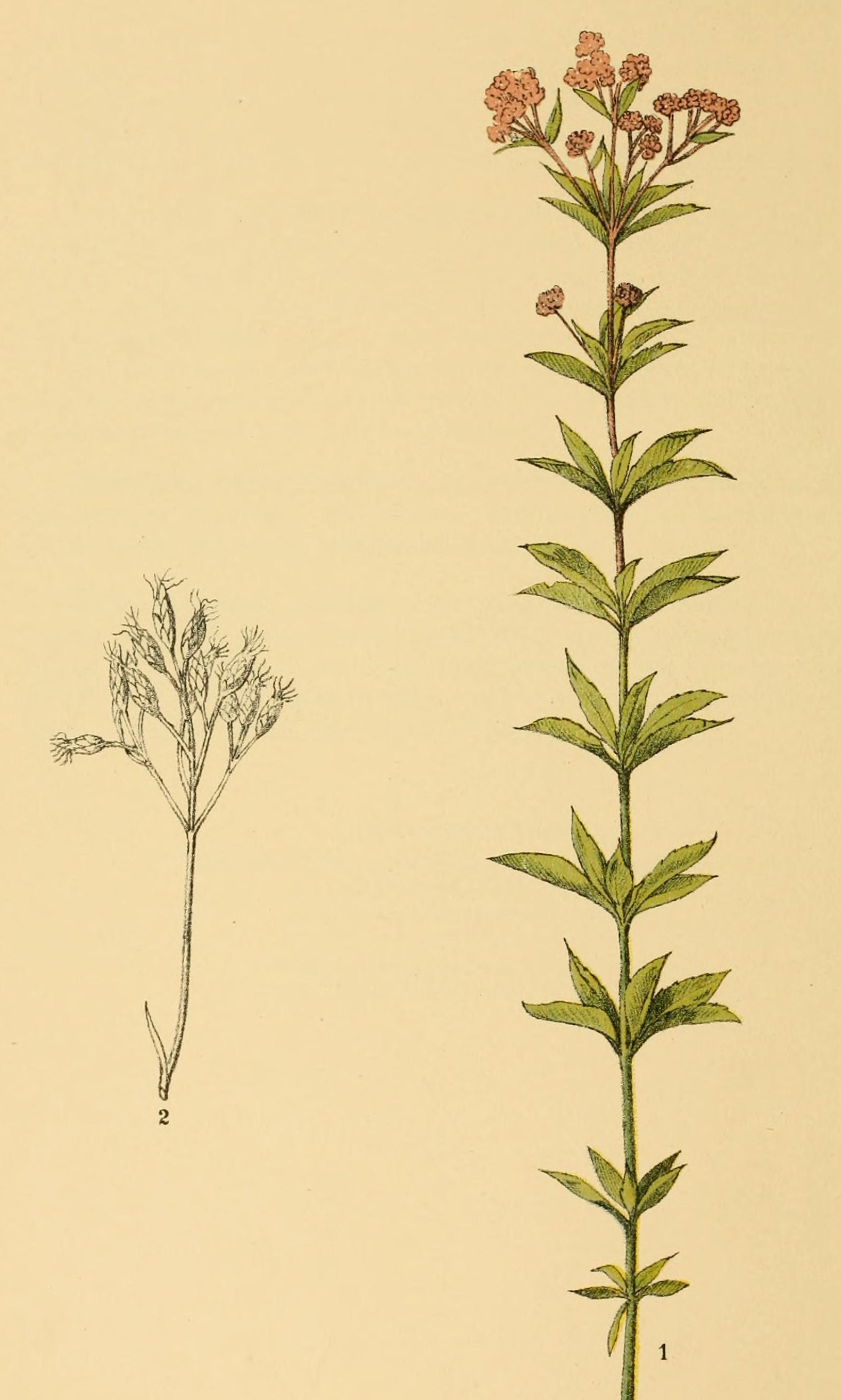
Eupatorium purpureum (L)
 Synonyms: Queen of the Meadow, Joe-pye weed,
Jopi weed, kidney root, kidneywort, purple boneset, trumpet weed, gravelweed,
hempweed
Synonyms: Queen of the Meadow, Joe-pye weed,
Jopi weed, kidney root, kidneywort, purple boneset, trumpet weed, gravelweed,
hempweed
Order: Compositae
Description: Eupatorium purpureum is a native North American perennial plant found in damp woodland and meadows in southern Canada and from Maine to Florida and Texas. The woody, fibrous rootstock produces one or more hollow stems, from 1-3m high and marked with purple where the leaves attach. The elliptic-lanceolate, coarsely serrate leaves grow in whorls of four to six. Flower heads of six or seven flowers, varying from purple to whitish, grow in loose terminal clusters from August to September.
Parts used: rhizome and roots
Collection: late summer and autumn, when the plant has stopped flowering.
Constituents: volatile oil, a yellow flavonoid (eupatorin), resin
Actions: antilithic, diuretic with a soothing effect on the urinary system, antirheumatic, astringent, tonic, promotes menstruation, tones the pelvic viscera in general
Indications: urinary calculus, cystitis, dysuria, urethritis, prostatitis, rheumatism, gout
Therapeutics and Pharmacology: Useful for kidney problems, urinary difficulties and gravel, dropsy, rheumatism and neuralgia. Used primarily for kidney stones or gravel, it is also of benefit in the treatment of cystitis, dysuria and urethritis. It is also used in pelvic inflammatory disease. It can play a useful role in a systemic treatment of rheumatism and gout as it encourages excretion of excess uric acid. It tones the reproductive tract and is used to treat inflammation of the prostate, spasmodic dysmenorrhoea with scanty menstruation; and to ease childbirth.
Combinations: with Alchemilla arvensis, Parietaria or Hydrangea in urinary calculus. Use with Lamium for prostate problems.
Preparation and Dosage: (thrice daily)
Regulatory Status GSL
Dried rhizome and root: 2-4g or by decoction - use for period pain or sip during labour and for its cleansing effect for persistent urinary infections.
Liquid extract: 1:1 in 25% alcohol, 2-4ml
Tincture: 1:5 in 40% alcohol, 1-2ml
Additional Comments: Gravel root takes one of its common names from Joe Pye (or Jopi), a New England Native American named Joe Pye, who was famous for curing typhus with 'joe-pye weed'.
Bibliography
BHMA 1983 British Herbal Pharmacopoeia, BHMA, Bournemouth.
Grieve, M. 1931 A Modern Herbal, (ed. C.F. Leyel 1985), London.
Hoffmann, D. 1990 The New Holistic Herbal, Second Edition, Element, Shaftesbury.
Lust, J. 1990 The Herb Book, Bantam, London.
Mabey, R. (ed.) 1991 The Complete New Herbal, Penguin, London.
Mills, S.Y. 1993 The A-Z of Modern Herbalism, Diamond Books, London.
Wren, R.C. 1988 Potter's New Cyclopaedia of Botanical Drugs and Preparations, C.W.Daniel, Saffron Walden.










